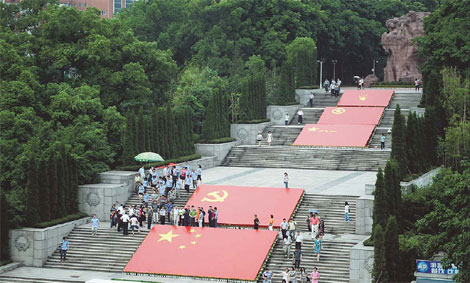Tourism flourishing as more delve into past
 0 Comment(s)
0 Comment(s) Print
Print E-mail
China Daily, June 27, 2011
E-mail
China Daily, June 27, 2011
Songs, stories and sites awash with revolutionary red are no longer merely spiritual assets in China but a potential source of revenue in the hands of today's business-orientated managers.
 |
|
Tourists visit the Geleshan Revolutionary Martyrs' Graveyard in Southwest China's Chongqing municipality on June 10. |
An example of this is the management center in Southwest China's Chongqing municipality that operates the Hongyan (Red Crag) Revolution Museum, which offers exhibits about jails that once housed communists. Today, it is restructuring its red-derived assets and preparing for a public listing.
The Chongqing Hongyan Alliance Culture Development and Management Center runs the local State-owned museums that are free to visitors. Its peripheral offerings - value-added extras such as shows, theaters, additional exhibitions and the sale of prints and souvenirs - have been incorporated as a company named the Hongyan Culture Industry Group.
"These are the best years and the best market we have seen," said Li Hua, director of the facility.
"The sector is ready to be expanded and we have engaged consultants to help restructure the Hongyan Culture Industry Group to be qualified to be listed in three years."
According to Li, the number of visitors to the group's revolutionary sites grew from about 3 million in 2008 to more than 6.5 million last year. During that period, the central and local governments invested more than 250 million yuan ($38.6 million) on building and revamping exhibition halls and other infrastructure.
While visitors do not have to pay to get into the museums, Li said red culture has spawned many business opportunities. One of its offerings is a show featuring representations of jailed communists enduring torture and embroidering a five-star flag made from red bedding and grains of rice.
"The red stories and culture is the pillar of our enterprise," he said. "The income from these commercial operations can be used to improve the historical sites. This is a supplementary process."
Song Ziqian, a senior policy researcher at the China Tourism Academy, said "the development of red tourism outpaced regular tourism in recent years".
Song said the main reason for its success is the fact that a series of important events took place in China that arouse nationalism and affection for the Party. These included the 2008 Beijing Games, the 2010 Shanghai World Expo, the 60th anniversary of the founding of New China and the upcoming 90th anniversary of the Party.
"When multiple values collide, some people compare these values and rediscover their preference for collectivism or idealism," Song said. "Then, the red values are revived in them."
Song said the market will take over the role of the government in future in driving the development of red tourism, as is already happening in Chongqing.
"The promotion of red tourism will become more of a market role than a government role," he said.





